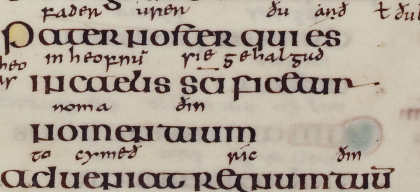“Lead us not into translations.”
Devra Torres | Dec 15, 2017

That's Aleteia's way of putting it, and it's my favorite of all the headlines I've seen about Pope Francis' recent comment on the French Bishops' translation of the Lord's Prayer. The Holy Father approved of their approval of the French equivalent of "Let us not fall into temptation" rather than the unfortunate "Do not submit us to temptation."
As he so often does, Jimmy Akin has the most clear, succinct, and straight-talking account of what actually happened (and what didn't). More background information can be found here, in a Catholic World Report article by Christopher R. Altieri. (I would quibble, though, with that headline writer's use of "Pope Francis' confusing remarks." There's plenty of confusion, but it's self-inflicted, or headline-writer-inflicted. There's no cause to blame the Pope here.)
As a translator, I have a lot of thoughts about the whole kerfuffle (though I don't pretend to speak Aramaic, Greek or French, and my Latin's not very respectable, either). Still, I've long been fascinated by the business of translation itself, and how to skate carefully between clunky over-literalism and reshaping the author into your own image and likeness. There's a fine line, as the Italian has it, between traduttore (translator) and traditore (traitor.)
And as a personalist concerned with doing justice to the subjectivity of both original-language author and target-language reader, I find it even more fascinating.
The translator requires something more than an exhaustive dictionary. I find I need to take into account what the author was trying to say, what contemporary readers would have understood, and how to express that in the target language--with no loss of accuracy, connotation or style. And without being culturally or historically tone-deaf.
With liturgical translation, there's the additional concern of avoiding heresy and respecting long-established use, even when the words are not the ones you would have chosen. "Dynamic equivalence" has a bad name, and deservedly so, because it's been used as an excuse to ignore the author's--even the Divine Author's--meaning, and go spinning off wherever the translation committee's spirit (if such a thing could exist) might lead. Some texts approved in the late 1960s and '70s were often not translations at all, but covert "improvements"--like the way Credo was "translated" as We believe.
But there's a grain of truth in the idea of dynamic equivalence. Language isn't static--because persons aren't static--and equivalence is just what the conscientious translator is supposed to be striving for. Jimmy Akin has a good example--from elsewhere in the Lord's Prayer itself--of the kind of translation that's neither over-literal nor illegitimately "dynamic":
The previous petition in the standard Catholic version reads “and forgive us our trespasses, as we forgive those who trespass against us.”
That’s not what the Greek literally says.
It says, “And forgive us our debts, as we also have forgiven our debtors” (Matt. 6:12).
Debts are a Semitic metaphor for sins, and the English translators have rendered this non-literally as “trespasses” to make the concept clearer to English-speakers.
Luke did the same thing for Greek-speakers in his version of the Lord’s Prayer, where this petition reads, “and forgive us our sins, for we ourselves forgive every one who is indebted to us” (Luke 11:4).
Notice how Luke shifts the first reference to “debts” to “sins” to make the meaning clearer.
Also note that, since Luke is divinely inspired, God doesn’t have a fundamental problem with using less literal translations to help people understand.
Here, the translator needs to know not only what a debt or a trespass is, but also the function of an ancient metaphor. And notice how Akin speaks of "helping people understand"--indicating concern for the text as it's taken in by the subject as well as whether it's objectively accurate. We could even speak of "excessive objectivism" in translation, as long as we don't get carried away, misapplying it to everything that's not to our own taste. And without a doubt, there's such a thing as excessive subjectivism. Treachery is the translator's ever-present temptation. But either way, there's far more in play than simply "getting it right" or "getting it wrong."
This fits in nicely with the Catholic view of the inspiration of Scripture. It's not a dictation theory: the idea is that the Divine Author saw to it that what He wanted written would be written, and the human authors, rather than just copying it down word for word, wrote in a way that reveals their own characters, cultural backgrounds, and life experience. Like a good personalist, He deigns not to squash the personalities of His puny "colleagues."
The Holy Father's point that God is not the one who tempts us is borne out by Scripture itself (James 1:13). The question of how to express that without treachery, heresy, banality, or inaccuracy--well, that's a matter of translation.
-------------------
Image Credit: Wikimedia Commons
